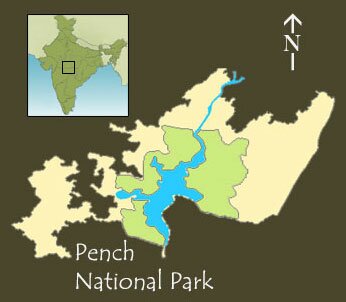|
|
Pench National park, nestling in the lower southern reaches of the satpuda hills is named after Pench river, meandering through the park from north to south. It is located on the southern boundary of Madhya Pradesh, bordering Maharashtra, in the districts of Seoni and Chhindwara. meandering through the park from north to south. It is located on the southern boundary of Madhya Pradesh, bordering Maharashtra, in the districts of Seoni and Chhindwara.
The undulating terrain of Pench is covered with small hills and well stocked taek and mixed forest. The main flora being Teak (Tectona grandis) , Saja (Terminalia tomentosa), Bija (Pterocarpus marsupium), Lendia, Haldu, Dhaora, Aonla, Amaltas etc. The ground is covered with a number of grasses, bushes, herbs & shrubs. Dazzling white Kullu trees scattered around singly in the forest is conspicuous among various hues of green. The old plantations of Teak & Bamboo add orderly vistas in the otherwise general wilderness.
The flow of Pench river stops in December, what remains are a few scenic and serene pools in the river bed. There are a few perennial springs and tanks. At the southern boundary of park, the Pench river has been dammed for Pench hydroelectic project at Totladoh. At the maximum capacity the reservoir submerges 54 sq kms of the park area. This had been the loss of best valley forest, which was once referred by Sir Rudyard Kipling in his book named "Jungle Book". This large reservoir of Pench with sporadic islands attract a number of winter birds from north.
Cheetal, SamBAR, Neelgai are commonly seen grazing on the open sites on roadsides and banks of river & reservoir. Jackals can be seen in search of food anywhere in park . Packs of wild dogs can also be seen occasionally . Herds of Gaur can be spotted near streams and bamboo patches, more common during summer months.
Langurs are very common. Whereas Rhesus monkeys may be seen occasionally on the fringes There are around 50 Tigers and 30 Leopards they are a shy lot and can be seen on roads and near water pools of river during summer months. Pench boasts of more than 210 species of birds including several migratory ones. Commonly seen are Pea fowl, Red jungle fowl, Crow pheasant, Crimson breasted barbet, Redvented bulbul, Racket tailed drongo, Magpie robin, Lesser whistling teal.
November to June
Wildlife safari timing in Pench national park is just like most parks in the country. Timings for entry into, and exit from, the park vary according to the season. In winters, due to the shorter duration of daylight hours, the morning entry time is later and evening exit time is earlier.
Winter Timings:
Entry:
Morning Safari: 0730 hrs
Evening Safari: 1500 hrs
Exit:
Morning Safari: 1030 hrs
Evening Safari: 1730 hrs
Summer Timings:
Entry:
Morning Safari: 0630 hrs
Evening Safari: 1600 hrs
Exit:
Morning Safari: 0930 hrs
Evening Safari: 1830 hrs
Safari Timings:
Morning:
Nov 1 to Feb 15 & May 1 to Jun 30 (6 - 11 AM)
Feb 16 to Apr 30 (6 AM - 12:20 PM)
Evening:
Nov 1 to Feb 15 (2:30 - 5:30 PM)
May 1 to Jun 30 (3:30 - 6:20 PM)
Feb 16 to Apr 30 (4 - 7 PM)
|
Park Charges (in Indian Rupees)
|
| |
Indian |
Foreigners |
| Entry Fees |
60.00 |
500.00 |
| Vehicle (per trip) |
1000.00 |
1000.00 |
| Vehicle Entry (per trip) |
150.00 |
150.00 |
| Guide Charges (per trip) |
75.00 |
75.00 |
| Still Camera |
60.00 |
60.00 |
| Video Camera |
300.00 |
300.00 |
|
(Rates are subject to change)
By Air : Nagpur is the nearest airport connected by daily Indian Aitlines flight from Delhi & Mumbai. Jet Airways flies daily to Nagpur from Delhi & Mumbai.
By Rail : Nagpur is the nearest railhead connected by regular trains from major Indian cities.
By Road : The route from Nagpur is through the national highway no. 7 to Khawasa via Kamptee, Mansar, Deolapar and Manegaon. From here, take the district road to Pench National Park.
Distances from Major Cities
Nagpur : 92 km
| Tips & Important Information |
-
There are three entry gates to the park, the Turia gate (the most convenient entry gate), Karmajhuri gate and the Jamtara gate.
-
Private vehicles are allowed inside the park but only with the company of an authorised guide.
-
Early morning safari can be the most rewarding if you want to spot tigers and other rare animals.
Try not to wear flashy clothes and strong smelling perfumes.
-
Follow the instructions of your guide and do not pollute the environment.
-
Wildlife Heart Throb (17 Days) à
-
Exclusive Indian Wildlife (14 Days) à
|

 meandering through the park from north to south. It is located on the southern boundary of Madhya Pradesh, bordering Maharashtra, in the districts of Seoni and Chhindwara.
meandering through the park from north to south. It is located on the southern boundary of Madhya Pradesh, bordering Maharashtra, in the districts of Seoni and Chhindwara.